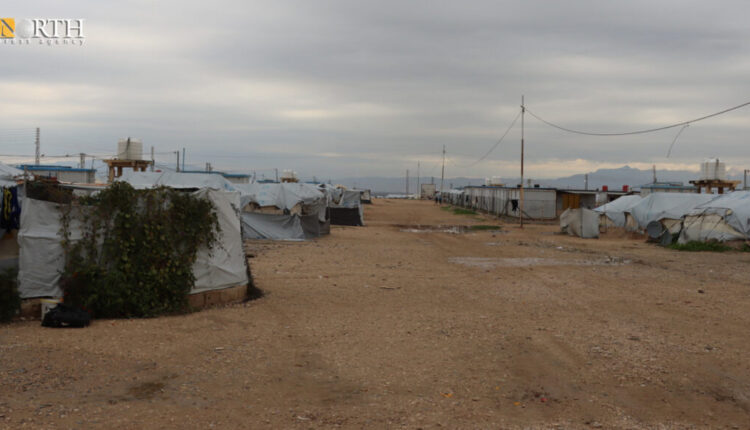
By Hakim Ahmad
QAMISHLI, Syria (North Press) – Displaced families in Newroz camp in countryside of Derik (al-Malikiyah) in far northeastern Syria, suffer from lack of medical services, forcing patients to endure the hardship and costs of traveling to the city to get medications and treatment.
The camp, which is managed by the Autonomous Administration of North and East Syria (AANES), houses 1,100 families displaced from the city of Sere Kaniye and the town of Tel Abyad, northeast Syria, both occupied by Turkey and its affiliated armed opposition factions, aka the Syrian National Army (SNA) in October 2019. The camp also includes displaced people from villages in the countryside of Tel Tamr and Zirgan (Abu Rasin) on contact lines with areas held by the SNA, which witness frequent shelling.
Public health services related to Internal Medicine, Obstetrics and Gynecology, and Pediatrics, are provided by the medical center of the Kurdish Red Crescent (KRC), meanwhile other NGOs provide special services.
The KRC, locally known as Heyva Sor A Kurd, is an independent non-governmental and non-profit organization operating in Northeast Syria. It was established in 2012 to provide medical services for the people affected by the conflict.
Abdullah Omar, who is an IDP from Sere Kaniye, along with other IDPs in the camp are forced to go to private clinics and pharmacies in the city of Derik to get drugs because they are not available at the medical center.
Soaring costs
Omar told North Press he went to a dentist in the city because the KRC medical center could not provide that service. Moreover, he bought painkillers, herbs, and flu medications from private pharmacies.
He added that he went to the dispensary in the camp many times, but he only got a prescription for drugs, which he purchased from pharmacies in the city. Omar also pointed out the absence of a night shift doctor in the camp.
Medication prices have skyrocketed in 2023 after the Syrian government raised the fees twice, adding to that shipping expenses to enter areas of Northeast Syria.
IDPs believe that NGOs operating in the camp should assist patients and their relatives in providing treatment or help with the expenses of their treatment that they cannot afford considering their current circumstances.
Meanwhile, Maha Hassan, an IDP in the camp, said cases of sick children are increasing during the winter because of a shortage of heating means.
Like other IDPs, she wondered why they had not received heating fuel.
“It is extremely cold here in the camp. We have not received fuel for heating yet,” she said.
She pointed out that she went to camp’s medical center for two days in a row because her child did not get better because of the cold.
“We cannot stand the cold without a heater in this time of the year,” she added.
Frequent visits
Abdulaziz Muhammad, an IDP from Sere Kaniye, stands in front of the medical center and talks to nurses on how to secure drugs for his sick daughter. He asks about ways to get her to the hospital in the city in case her condition relapses.
Muhammad justifies why some parents repeatedly visit the center every day, despite being informed the first time that medications are unavailable. He explains that the patients’ relatives might not be able to get drugs from outside the camp. So, they check the center in the hope of possibly obtaining drugs.
Dunya Suleiman, a nurse at the KRC center, said IDPs rely on kerosene heaters in winter, which exacerbate the condition of respiratory and asthma patients.
She told North Press that the medical center in the camp receives only one shipment of drugs every month from the KRC warehouse.
“We do not receive enough drugs for chronic cases. Patients are forced to get drugs from outside the camp. It is very difficult for them to go to the city,” Suleiman said.
She attributes the shortage of services at the center to a lack of support.
She added that the amount of drugs that the center receives “does not cover the camp’s need due to the large number of IDPs in camp.”
